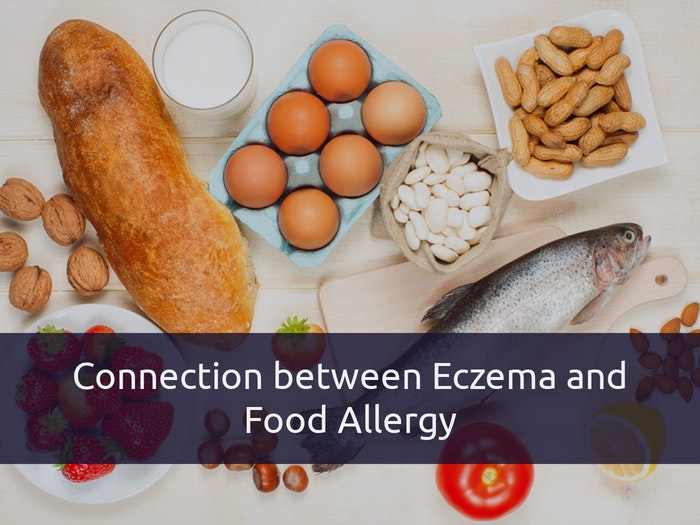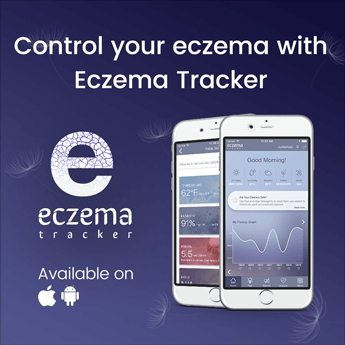Link Between Eczema and Food Allergies
There is now a direct link between eczema and food allergies. While atopic dermatitis may be triggered or worsened by common food allergies such as those to eggs, milk, wheat, soy, and peanuts, eczema itself may be responsible for the development of food allergies in the first place.
Food allergies are considered official comorbidity (related health condition) of atopic dermatitis alongside asthma, allergic rhinitis (hay fever) and depression. As a result, they believe that if they could just cut certain foods from their diets, such as gluten or dairy, their eczema will go away.
Eczema is a serious skin condition that can cause itchy skin rashes, skin irritation and oozing blisters. It can also result in the flaky patches in severe condition. The cause of eczema is still not known but hereditary and environmental triggers usually play a major role in developing skin condition. The eczema symptoms may get worse as soon as a patient comes in the direct contact with the allergens/irritants.
Have you ever had eczema as a child and now usually develop hay fever, asthma or skin allergies as an adult? Is your child developing red, irritated, itchy, flaky patches on the skin? There may be few questions that you might have in your mind:
- Can eczema be caused by food allergies?
- What food to avoid when you have eczema?
- What are the most common food allergies?
- Are allergies and eczema related?
- Does food allergy cause eczema?
- What foods cause eczema to flare up?
If this is the case then as per various studies if one or both parents have eczema, seasonal allergies or asthma then a child is more likely to have eczema. Children suffering from the same may be more at a risk of getting allergies that particularly includes food allergies.
Understanding the connection between the same can help you manage the skin condition. Food Allergy can be considered as one of the main causes of eczema for the young children. This may be noted that many people who have eczema are also diagnosed with the food allergies.
What is Food Allergy?
Food allergies are the allergic reactions to different foods that acts as eczema triggers. It is an abnormal response to the foods triggered by your body’s immune system. In adults and children different foods like fish, peanuts, soy, wheat, eggs, tree nuts and milk can cause allergic reactions. As per the studies conducted 1 in 25 children is affected by food allergy. Food allergies can be divided into two types:
- Immediate : The symptoms begin too quickly after eating certain foods
- Delayed : The symptoms begin within 15-20 minutes after having certain foods
Also Read: Delayed Food Allergy – Symptoms, Diagnosis and Treatment
An allergic reaction to food can affect the gastrointestinal tract, respiratory tract, skin and in severe cases cardiovascular system.These reactions may be unpredictable and can range from mild to severe including life threatening conditions. Keep in mind that children may communicate different symptoms than adults.
What are the Symptoms of Food Allergy
Mild to moderate symptoms may include:
- Hives (reddish, swollen, itchy areas on the skin)
- Eczema flare (a persistent dry, itchy rash)
- Redness of the skin, particularly around the mouth or eyes
- Slight, dry cough
- Vomiting
- Diarrhea
- Odd taste in mouth
- Stomach pain
- Itchy mouth or ear canal
- Nasal congestion or a runny nose
- Sneezing
- Nausea
Severe food allergies symptoms may include inflammation of the tongue, lips or throat that blocks the respiratory tract. Few symptoms include:
- Trouble swallowing
- Drop in blood pressure (feeling faint, confused, weak, passing out)
- Loss of consciousness
- Shortness of breath or wheezing
- Turning blue
- Chest pain
- Sense of “impending doom”
- A weak or “thready” pulse
How Food Allergy is Diagnosed?
The symptoms may very from an individual to individual during allergic reaction. As soon as the trigger food is eaten a person may develop the symptoms that can affect their skin, respiratory tract, cardiovascular system and more.
It’s sometimes impossible to predict how severe the next reaction will be and this should be kept in mind that each patient should be carefully counseled about the food triggers that causes fatal reactions.
These food allergies in adults, food allergies in babies may develop at any age but most probably will appear in the childhood. If in any case you feel a slight amount of allergy, you must visit an allergist as he/she can guide you for the medical tests, allergy examinations and will take care of your condition.
You will have a detailed list of questions about your eating habits, medical history and the symptoms so be prepared to answer the questions like:
- What you eat?
- How much you eat?
- Did anyone else was sick?
- How was the food prepared?
- Is it happens everytime when you eat this specific food?
- What was the reaction timing?
- Did it occur immediately after eating specific food or was delayed for half/one hour?
- What are the symptoms you experienced?
- How long it took for the symptoms to develop?
- How long the symptoms existed?
After knowing about your medical history, your allergist may ask for the allergy tests, skin tests or blood tests that will indicate whether the food-specific immunoglobulin (IgE) antibodies are present in your body or not?
- Blood Tests: The test measures the amount of antibody (IgE) to the specific foods being tested. The results may be available in a week.
- Skin Prick Tests: The skin is pricked with a tiny probe. A liquid containing a small amount of food allergen is placed on the skin of the back or arm and this liquid is allowed to seep under the skin. This test isn’t painful but may be uncomfortable for many individuals. The results for the test are provided within 30 minutes.
Read here in detail for both Allergy Testing
Your allergist will use these results to analyse, diagnose and manage the skin condition. In few cases, your allergist may ask for an oral food challenge, one of the most accurate way to diagnose food allergy.
The food challenge is conducted under strict medical supervision in which the patient is given tiny amount of the suspected food in the increasing dosage over a specific time period, followed by few hours of analysation and observation as to see if any reaction occurs or not.
This is helpful in those cases when the patient’s medical history, skin tests or blood tests are unclear.
Foods to Avoid if you are a breastfeeding mother to a baby with Eczema:
This is very well known that a mother’s milk can help their babies grow a stronger immune system. But there may be cases when the foods eaten by the mother can affect their baby’s health. Proteins in many foods can usually pass into the breastmilk and cause various allergic reactions.
If you suspect that your baby is developing eczema due to an allergy of food protein passing through the breast milk, immediately consult your doctor about the elimination of those foods from your diet.
Also Read: Do You Know : U.S Children Are More Prone To Allergy Risks
If you are breastfeeding mother then you must avoid foods that include:
- Soy – Toddlers who develop allergic reaction to dairy products may also be allergic to soy. Many foods include soy as the main ingredient so avoiding soy while breastfeeding is must and will require a careful monitoring.
- Dairy Products – In some babies the cow milk’s protein is not easily digested and is recognised as an allergic substance. Dairy products like milk, cheese, cream, butter and yogurt are few of the known allergic foods for the toddlers. Avoid eating dairy products that can harm your baby’s skin condition.
- Peanuts and Eggs – Eggs and Peanuts are the two main foods that can cause high allergic responses in some people. You must know, raw eggs eaten on the regular basis can cause a biotin deficiency that can trigger eczema. There may be a possibility that the proteins may pass from your breast milk to your baby so avoiding these may help your child get rid of the eczema symptoms.
- Food Preservatives – Foods including various additives like artificial flavors, colors, preservatives may cause an allergic reaction in few babies as passed through the mother’s milk. Foods treated highly with preservatives amy consider as allergy causing food and you should avoid eating it.
List of Foods That Cause Allergies in adults and children
Approximately 90% of food allergies is caused by few below listed foods:
- Dairy products
- Eggs
- Peanuts
- Nuts
- Soy
- Wheat
- Gluten
- Fish (mostly in adults)
- Shellfish (mostly in adults)
- Fast food
- Some cakes and smoothies
- Food with high sugar content
Read Information on Common Food Allergies
How to Treat Food Allergies?
Once you are diagnosed with the food allergies the next step is to talk to your allergist about the treatment. You allergist will provide you a written dietary plan so as to help you manage the skin condition.
Eczema Safe Foods – That Help Ease Eczema (Infographic)

Effective food allergy treatment includes:
- Strictly avoiding the trigger foods
- Keeping your medications with you wherever you go
- Taking the medicine at the first sign of the occured reaction
- Immediately rushing to your doctor in case of emergency or any allergic symptoms
- Read ingredients before eating or drinking anything
- Avoid foods with the additives
- People with anaphylactic reactions to trigger foods must wear medical alert necklaces or bands
- Should carry two syringes of epinephrine with them
We have also shared eczema diet plan that can help you manage your skin condition in a perfect way. In other blogs we also have eczema-friendly recipes that can be helpful for anyone suffering from eczema. Quick and easy to make recipes so that you don’t have to scroll anywhere else.
Here’s published studies provide new insights into the relationship between food allergies and eczema.
Reference Studies:
- http://www.eurekaselect.com/163041/article
- https://www.nih.gov/news-events/news-releases/scientists-identify-unique-subtype-eczema-linked-food-allergy
- https://www.cdc.gov/healthyschools/foodallergies/
- https://nationaleczema.org/eczema-food-allergies/
Also Read:






